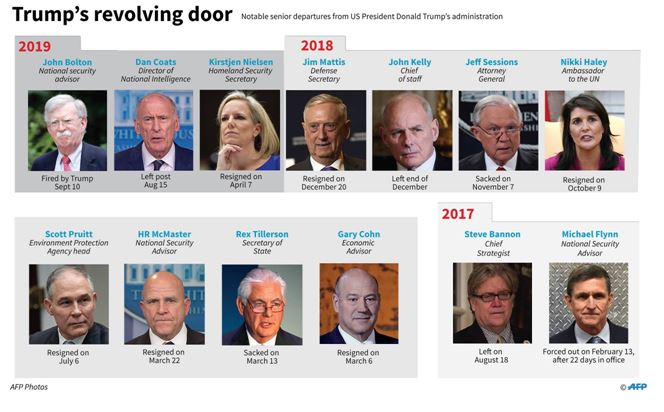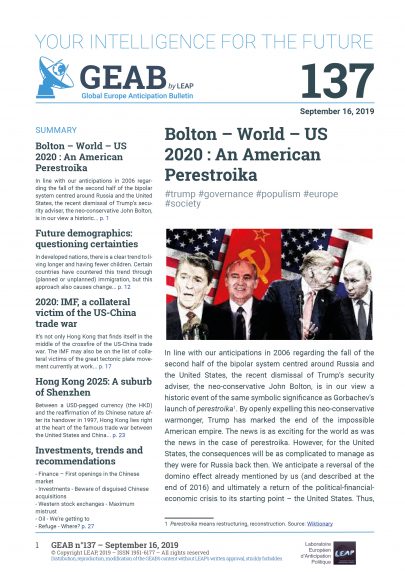GEAB 137
In line with our anticipations in 2006 regarding the fall of the second half of the bipolar system centred around Russia and the United States, the recent dismissal of Trump’s security adviser, the neo-conservative John Bolton, is in our view a historic event of the same symbolic significance as Gorbachev’s launch of perestroika[1]. By openly expelling this neo-conservative warmonger, Trump has marked the end of the impossible American empire. The news is as exciting for the world as was the news in the case of perestroika. However, for the United States, the consequences will be as complicated to manage as they were for Russia back then. We anticipate a reversal of the domino effect already mentioned by us (and described at the end of 2016) and ultimately a return of the political-financial-economic crisis to its starting point – the United States. Thus, we are writing here an article which is very (perhaps a little too) optimistic about the ebbing of global geopolitical tensions and extreme solutions, while ending on a pessimistic note about the economic and political outlook of the United States.
America’s two far-rights
In April 2018, we concluded that Trump had placed Bolton as close to him as possible, not necessarily to benefit from his guidance but to be able to watch him. Bolton is a neo-conservative – more precisely, an extreme-American-imperialist-sent-by-God-Himself éminence grise from the Bush-Junior era and his tribe of Armageddonists.[2] Although located at the far right of the US political spectrum, Trump is the opposite of this vision. Having his roots in the breeding ground of the isolationist, protectionist and anti-globalisation alt-right,[3] he advocates a return home for the United States and an end to its exhausting interference in world affairs: “America first” instead of “America world”, as we have said many times since November 2016.[4]
Trump is probably the first of the American presidents since the Second World War to have had America’s ‘de-imperialisation’ as a political objective. Much more than Russia, China or Europe, his main opponent is the American state apparatus. The whole US state apparatus? No! Otherwise Trump would not be in the White House… As we pointed out in 2016, even the military apparatus decided to support his candidacy in the final run for the election. (As a reminder, in 2016, the United States was on the brink of an open conflict against Russia over the Syrian question and hence it was time to back-pedal[5])…
Nevertheless, Trump is advancing upwind against an entire state apparatus accustomed to world domination, in a fight against the reflexes, habits, processes and laziness of any administration. But, hidden in the nooks and crannies of this administration, there are also the tough guys, the warmongers and ideologues of US imperialism: the famous “neo-conservatives” of the Bush-Jr era!
It was, therefore, clever of Trump to choose one of the most twisted and influential of them, John Bolton, and to place him in full spotlight by his side. Under close surveillance to avoid any slippage, the extremist policy of the neo-conservatives was put to the test, thus demonstrating that it could only lead to wars – wars that neither US finance nor US military capabilities could support.[6] This having been shown, since 10 September (the date of Bolton’s dismissal), a new stage in Trump’s foreign policy has begun.

Figure 1 – Significant departures from Trump administration, 2017-2019. Source: AFP.
The failures of Trump’s policy
For a little over a year, Trump’s international strategies, which we had patiently deciphered/anticipated in the first two years of his mandate, have all failed: Iran, North Korea, China and Venezuela, to name just the main ones. In each case, the arm-wrestling has so far led only to a hardening of the positions of the governments concerned. At a time when the tensions generated were becoming unbearable, Trump blamed everything on Bolton, accusing him, in particular, of having broken the US-North Korea agreement on nuclear tests, of being far too intransigent towards Iran,[7] of having prevented him from advancing on Venezuela[8] and of having been in the drafting of all presidential orders concerning the Huawei case.[9] While we have no doubt that Bolton has indeed contributed to toughening Trump’s foreign policy in recent months, he is also and above all the ideal trigger to induce a big boost in the conduct of Trump’s diplomacy without a loss of face.[10]
This is not the first time we have explained in these pages that Trump is a catalyst for change because, instead of trying to prevent the various players from following through on their schemes (as Obama did) and thus blocking any possible outcome, he tells them to go for it… and watches the windbags deflate one after the other.
Login

In developed nations, there is a clear trend to living longer and having fewer children. Certain countries have countered this trend through (planned or unplanned) immigration, but this approach also [...]
It's not only Hong Kong that finds itself in the middle of the crossfire of the US-China trade war. The IMF may also be on the list of collateral victims [...]
Between a USD-pegged currency (the HKD) and the reaffirmation of its Chinese nature after its handover in 1997, Hong Kong lies right at the heart of the famous trade war [...]
Finance – First openings in the Chinese market Our investment recommendations on the Chinese financial market are not easy to follow due to lack of accessibility. However, gradually the Chinese [...]

Comments